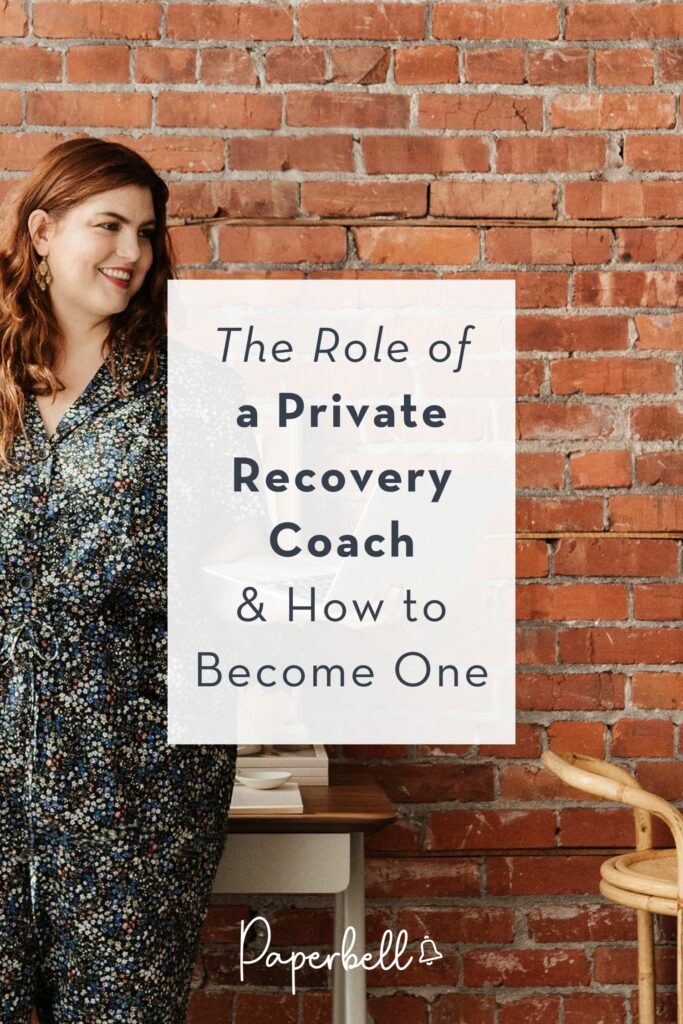Private recovery coaches can support clients with the daunting challenges that come with addiction. If you’re considering specialization in sobriety or addiction coaching, you must understand what this career path entails.
Let’s examine the role of a private recovery coach and the impact they can have in this transformative field.
What is a Private Recovery Coach?
A private recovery coach is a professional who provides personalized support and guidance to individuals striving to overcome addictions and maintain long-term recovery. Unlike clinical therapists or counselors, recovery coaches focus on practical, everyday strategies to help clients navigate the challenges of addiction recovery.
While recovery coaches are often associated with drug, alcohol, and substance addictions (also called sobriety or sober coaches in this case), their scope extends to various other addictions, including:
- Food addiction
- Sex, love, and porn addiction
- Shopping addiction
- Gambling and gaming addiction
- Exercise addiction
- Digital addictions such as social media
They use a combination of life coaching techniques and accountability to assist clients in maintaining their recovery journey. They create a structured recovery process and offer crisis intervention, which is why some are also known as intervention coaches.
Many recovery coaches have personal experience with addictions, which lets them show up as mentors to their clients. They typically seek training in recovery coaching techniques to help clients through a structured and evidence-based methodology.
The recovery coaching process typically includes the following:
- Developing a sustainable recovery plan: Crafting a personalized plan that outlines steps for overcoming addiction and maintaining sobriety.
- Preventing relapse: Implementing strategies and practices to help clients avoid returning to addictive behaviors.
- Removing obstacles to recovery: Identifying and addressing physical, emotional, and psychological barriers that hinder recovery.
- Building a support network: Helping clients establish a network of supportive individuals who can aid their recovery journey.
- Using stress reduction strategies: Teaching techniques to manage stress effectively without resorting to addictive behaviors.
- Educating clients on the impact of addiction: Helping clients understand how addiction affects the brain and body to foster better self-awareness.
- Coping skills for negative emotions: Providing tools and strategies to handle negative emotions healthily.
- Building self-esteem: Helping clients restore their confidence and sense of self-worth.
- Dealing with family and relationship issues: Offering guidance on resolving conflicts and improving relationships strained by addiction.
- Setting healthy boundaries: Teaching clients how to establish and maintain healthy boundaries with friends, family, and colleagues—especially if these relationships trigger their addiction.
What is the Difference Between a Recovery Coach and a Counselor?
Recovery coaches differ from counselors and therapists in several ways. Here’s what sets them apart.
Educational Path
To be licensed, therapists must study psychology, and then they can choose to specialize in addiction therapy through advanced education and clinical training.
In contrast, coaches don’t need formal qualifications to practice in general. However, depending on your state, some health and mental health niches require certifications or specialist recovery coach training.
Additionally, many recovery coaches are former addicts who have taken coaching training to be able to help people more effectively.
Approach and Techniques
Another significant difference is in their approach. Therapists use therapeutic (clinical) techniques to work through an addict’s trauma, help them process the emotions that lead to addiction, and change their thought patterns.
It’s a more fluid and less goal-oriented approach, but it can help deal with the possible root causes of addictions that often stem from childhood.
On the other hand, recovery coaches focus on action. They create step-by-step plans to help clients reach their goals and hold them accountable. They use a blend of consulting and coaching to advise clients and help them achieve milestones in their recovery journey.
Coaching instills a sense of self-responsibility in clients and makes them focus on present and future choices rather than delving into past emotional issues.
[ Read: The 8 Questions That Reveal Your Coaching Philosophy ]
Role and Responsibilities
A recovery coach is not a doctor and has no medical training; they cannot prescribe or administer medications. However, they can guide clients to the appropriate medical treatment when necessary.
They understand addiction signs, relapse triggers, and detox side effects (some from personal experience) and can advise clients to seek medical attention when needed.
With their medical and clinical backgrounds, therapists can provide in-depth psychological support and may collaborate with medical professionals to provide comprehensive care.
How to Become a Private Recovery Coach
1. Get Trained
If you have overcome addiction yourself, it can be a powerful asset in connecting with clients. However, personal experience alone is not enough; it should be backed up with specialized, evidence-based training.
Enrolling in a reputable recovery coach certification program equips you with the necessary skills and knowledge. Here are three examples of recovery coach certification programs to consider:
- Certified Professional Recovery Coach Training by IAPRC: An in-depth course combining self-paced online study and live skills practice sessions over 20 weeks. It costs $4,497 and provides 60 ICF credits for continuing education.
- Certified Recovery Coach program by Still Here: A five-day, in-person training session with the fundamentals of recovery coaching followed by 20 weeks of mentorship for more in-depth practice. It costs $2,195 and includes a two-day Ethical Considerations Course.
- Recovery Coach Training at Recovery Coach Academy: A UK-based program that combines five days of intensive online training with live sessions, as well as courses on ethical considerations, professionalism, and spirituality. It costs £1,697 (around $2,170) and includes 70 hours of training in total.
2. Gain Practical Experience
To put your studies into practice, you can start by volunteering or interning with addiction recovery centers or support groups. This hands-on experience allows you to apply what you learned in a real-world setting and helps you understand the nuances of recovery coaching.
Focus on developing critical skills like effective communication, asking insightful questions, active listening, and providing constructive feedback. Build trust with clients and create actionable recovery plans for their specific circumstances.
3. Establish Your Business
Start by defining your niche. Determine which type of addiction you want to specialize in, whether substance abuse, gambling, food addiction, or another area. This focus will help you target your marketing efforts to attract the right clients.
Decide whether you want to work independently or as part of a recovery coaching organization. Establish a business structure like a sole proprietorship or LLC and secure necessary permits. Create a professional and confidential space for coaching sessions, whether it’s a physical office or a virtual setup.
4. Start Selling Your Packages
Next, create coaching packages that outline your services, pricing, and program duration. Consider offering different packages to accommodate various client needs.
Paperbell can help you design custom packages for recovery coaching clients and automatically create landing pages for them. It also handles bookings, payments, and contracts, freeing time for your sessions and marketing initiatives.
Besides developing a professional website, consider leveraging other channels to market your packages. For example, you can use social media and online networks of support groups to attract clients.
[ Read: How to Get Coaching Clients: 19 Strategies That Actually Work ]
5. Build a Network
A supportive network of recovery coaches, therapists, and addiction specialists can help you collaborate to help clients comprehensively. For example, establishing relationships with healthcare providers and support organizations can create a referral system for clients needing additional services.

You can also join professional associations for recovery coaching. These organizations can provide access to research on the latest trends in addiction recovery and networking opportunities.
5 Recovery Coaches to Follow
Tanya D

Tanya D. is a certified meditation instructor, Reiki Master, and spiritual life recovery coach. She uses her personal experience and holistic techniques, like trauma-sensitive meditation and chakra healing, to help others find peace and freedom from addiction. She also serves as a Yoga4Sobriety Teacher Ambassador.
Michael Walsh

Michael Walsh is a renowned recovery coach, interventionist, and family coach with over 20 years of experience. He provides personalized support for addiction recovery, facilitates respectful interventions, and helps families rebuild trust. His compassionate, evidence-based approach has made him a trusted expert in the recovery community.
Savannah Esposito

Savannah Esposito is a certified addiction recovery coach with a Bachelor’s in Forensic Psychology. She created the National Certification for Sex Addiction Coaches and trains coaches in the latest recovery methods at The Addictions Academy.
Savannah is passionate about empowering couples and guiding them to develop healthy relationships. She specializes in helping them recover from sexual addiction, betrayal trauma, and intimacy issues.
Bob Marier

Bob Marier founded Hired Sobriety, a company that provides comprehensive support for addiction recovery. He’s an experienced interventionist and recovery coach and leads a team that facilitates interventions, sober coaching, and family support.
Their approach combines compassion with evidence-based strategies, helping individuals and families navigate the path to sobriety and wellness.
Brad Lamm

Brad Lamm, founder of Intervention.com, embarked on his recovery journey in 2003, overcoming drugs, bulimia, nicotine, and alcohol. His clinical intervention training events in the US have shaped leading interventionists nationwide.
Serving on the Association of Intervention Specialists board, he introduced treatment options at the state level, profoundly impacting communities.
How to Make Money as a “Sober Coach”
Coaching sessions and interventions are the most common ways to help clients struggling with addiction and their families. However, you can explore several other avenues to help people while creating additional revenue streams for your business.
Here are a few to consider:
- Private coaching: As mentioned, you can offer one-on-one coaching sessions with specific focuses. You can charge hourly or, better yet, set flat rates for your packages, including various sobriety coaching sessions, resources, and accountability services.
- Group coaching: Consider organizing group coaching sessions or workshops for individuals in early recovery or seeking ongoing support. Similarly to one-on-one services, you can charge per session or package rates for group sessions.
- Corporate wellness: Partner with companies to provide wellness programs and workshops addressing addiction and recovery in the workplace.
- Online courses: Develop and sell online courses or webinars focusing on sobriety, recovery strategies, and managing challenging relationships with people suffering from addiction.
- Speaking engagements: Share your expertise as a speaker at events, conferences, or educational institutions, discussing addiction, recovery, and the benefits of sober living.
- Content creation: Write articles, blog posts, or books about sobriety and addiction recovery. You can monetize these resources through advertising, book sales, or online platforms.
- Consulting: Provide consulting services to addiction treatment centers, sober living facilities, or healthcare organizations looking to improve their programs or services.
- Affiliate marketing: Partner with companies selling products or services related to sobriety, recovery, or wellness and earn referral commissions.
- Referral fees: Establish partnerships with therapists, treatment centers, or healthcare professionals and receive referral fees for clients you refer to their services.
Build a Thriving Recovery Coaching Practice
While you’re changing lives one session at a time, Paperbell can streamline the admin side of your business.
It’s an all-in-one client management tool that handles bookings, contracts, payments, and more. It also stores all your client information so you can keep everything organized and focus on your client’s recovery.
Try Paperbell for free with your first client.










